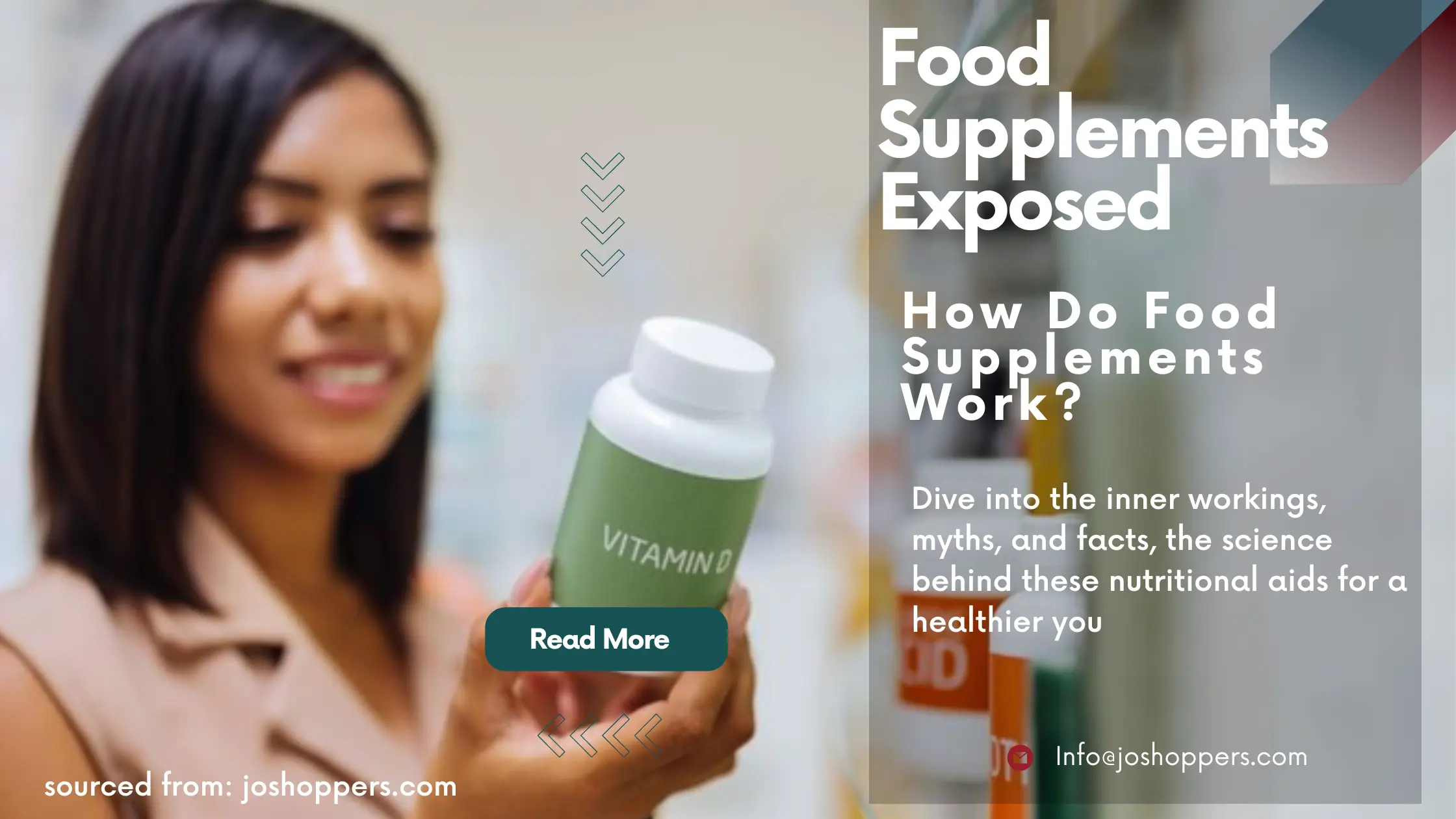Supplements for Blood Pressure in Uganda (Hypertension)
Aug 29, 2024

We have been hearing, Take this pill to make your skin glow! Boost your brainpower with a sprinkle of this powder, and in a minute, you will see miracles happening! Faced with these exaggerated claims, many of us feel a sense of urgency and concern. If you have ever gone to a supplement store or encountered enticing advertisements on platforms like Facebook and TV, I am sure you are aware of these promises of quick fixes and magic bullets for all that threatens you. and thus a raise of concern: how do food supplements work?
You are not alone. Millions of people search on the internet for answers, sorting through contradictory data and bold promises. This article digs deep to reveal the real workings of food supplements. By breaking down the myths and exposing the science, we will enable you to make well-informed decisions about the things you put into your body.
Forget specific products for now. This article focuses on understanding the fundamental mechanisms behind how any food supplement works, regardless of its claims. By the end, you'll have a clear understanding of how supplements interact with your body and be able to approach future choices with confidence.
Table of contents [Show]
The days of gullibly taking medications in the hopes of seeing rapid miracles are long gone. Although taking dietary supplements can have advantages, knowing how they function separates fact from myth. This section explores further the inner workings of several widely used supplements.
Recall that food supplements aren't miracle cures. They have certain interactions with your body, and understanding those interactions gives you the ability to make well-informed decisions. Let's look at the following:
a) The Nutrient Delivery System: We'll delve into the journey of a supplement, from ingestion to absorption. How do they get into your bloodstream, and what factors influence their bioavailability?
b) Individual Nutrient Actions: Different supplements play specific roles. We'll explore how vitamins, minerals, and herbal extracts exert their effects on various systems in your body.
c) Limitations and Myths Exposed: Not everything you read online is true. We'll shatter common misconceptions about instantaneous results, miracle cures, and one-size-fits-all solutions.
d) Personalization Matters: Your unique needs and health conditions determine which supplements might be right for you. We'll discuss the importance of consulting a healthcare professional for personalized guidance.
By the end of this section, you will have a comprehensive understanding of food supplements' functions, disadvantages, and possible role in promoting your general health. So let's set out on this adventure together to clear up the confusion about these commonly used products and learn how food supplements work because they do.

We have looked at the inner workings of dietary supplements, but do they live up to the expectations? This section helps you sort through the sometimes complicated world of supplement claims by separating fact from myth.
Food supplements can benefit specific health needs based on evidence-based research.
Explanation: Numerous studies support the benefits of specific supplements for targeted health concerns. For example, folic acid is proven to reduce neural tube defects in pregnant women, and calcium with vitamin D can support bone health in older adults. However, it's crucial to choose supplements based on personal needs and scientific evidence, not just marketing claims.
Supplements work like magical drugs, curing every illness.
Explanation: Unfortunately, there's no single pill or powder that can cure all health problems. While some supplements can address deficiencies and support particular health benefits, they don't treat or cure existing diseases. It's essential to manage health concerns through a holistic approach, including diet, exercise for senior citizens, and proper medical treatment.
A healthy diet remains the foundation for optimal health, and supplements only play a supportive role.
Explanation: Food supplements cannot replace a balanced diet full of fruits, vegetables, whole grains, and lean protein. These naturally contain a wide range of vitamins, minerals, and other nutrients your body needs to function optimally. Supplements might fill minor gaps or address specific deficiencies, and if they do, they're too expensive to sustain and later on can cause other underlying issues in the body mechanisms, but they should never be a substitute for a healthy diet.
All supplements are safe and effective for everyone.
Explanation: Some supplements can have side effects, like vitamin A causing toxicity in high doses. They can also interact with medications, potentially altering their effectiveness or causing adverse reactions. It's crucial to consult a healthcare professional before starting any supplement, especially if you have underlying health conditions or are taking medication.
Taking higher doses of supplements leads to greater benefits.
Explanation: More is not always better! Exceeding recommended dosages can be dangerous and even lead to toxicity. Supplements have specific safe upper limits, and exceeding them can cause various health problems. Always stick to the recommended dosage on the label or as advised by your healthcare professional.
Natural doesn't always mean safe regarding supplements.
Explanation: Just because a supplement is labeled "natural," that doesn't guarantee its safety or effectiveness. Even natural substances can have unintended consequences, and some might interfere with medications or have unknown side effects. Do your research and consult a healthcare professional before consuming any supplement, regardless of its labeling.
Supplements can prevent specific diseases like cancer or Alzheimer's.
Explanation: While a balanced diet and healthy lifestyle might contribute to lower disease risk, supplements alone cannot guarantee disease prevention. the research shows that supplements The most likely supplement to reduce cancer risk is Pure and Broken Ganoderma Spores Capsules; also, when taken in conjunction with other cancer treatments, the supplement may improve cancer recovery rates. Supplements cannot replace early detection, screening, and proper medical treatment for specific diseases.
All multivitamins offer the same benefits and address all nutrient gaps.
Explanation: Multivitamins come in various formulations with different nutrient compositions. Your individual needs and deficiencies determine the most suitable option. Consulting a healthcare professional can help you identify any potential gaps and choose the right multivitamin for your specific needs.
Remember, always consult a healthcare professional before starting any new supplement, especially if you have any underlying health conditions or are taking medication. They can guide you through the world of supplements securely and efficiently., addressing your specific needs and ensuring they complement your overall health goals.
When it comes to supplements, there's often a hint of magic cures and quick remedies. Let's examine the evidence and distinguish facts from fiction, though, before you go for that miracle medication.
Scientific Support: While not a magic bullet, some supplements show promising evidence-based benefits for specific needs. Here are a few examples:
Folic acid has been proven to significantly reduce the risk of neural tube defects in pregnant women.
These two are supported by research for maintaining bone health in older adults, especially with adequate dietary intake.
Research suggests potential benefits for heart health, reducing inflammation, and supporting cognitive function.
NMN is a precursor to NAD+, a vital coenzyme involved in energy production and cellular repair. Research suggests potential benefits for aging and longevity, but studies are still going on to identify more potential side effects. check NMN supplements
Resveratrol can guard against a variety of chronic diseases, including cardiovascular diseases (CVDs), cancer, liver diseases, obesity, diabetes, Alzheimer's disease, and Parkinson's disease. It possesses antioxidant, anti-inflammatory, immunomodulatory, glucose and lipid regulatory, neuroprotective, and cardiovascular protective properties. According to the National Library of Medicine,
For generations, this mushroom extract has been utilized in traditional medicine due to its numerous therapeutic characteristics, which include anti-inflammatory, anti-cancer, immune-boosting, and antioxidant activities. The National Library of Medicinereported that recent studies have concentrated on the potential advantages of G. lucidum in treating metabolic disorders, including diabetes and obesity, as well as its potential involvement in preventing and treating infections caused by the coronavirus.
Live bacteria called probiotics are well-known for their potential to improve digestion and gut health. Studies back up their efficacy in treating and preventing dysbiosis, which is characterized by an imbalance or deficiency of helpful bacteria in your microbiome. This is a major advancement in the use of probiotics to treat a specific condition. It is important to remember that their total efficacy depends on the particular strain and the needs of each individual. It is best to speak with a healthcare provider for personalized guidance.
Chondroitin and Glucosamine are two commonly combined and marketed for managing osteoarthritis, a condition causing joint pain and stiffness.
Studies provide mixed results on their effectiveness. Some report modest pain relief and improved function in osteoarthritis patients, while others show no significant benefits.
Their mechanism of action is also debated. They might partially rebuild cartilage or offer anti-inflammatory effects, but the exact role remains unclear.
Studies show stem cells can differentiate (transform) into any type of cell and may repair damaged tissue, They hold great promise for the treatment of a wide range of illnesses and conditions in regenerative medicine. However, the field is still in its early stages, and most applications are still under research or clinical trials.
For the majority of conditions, stem cell therapies are not yet easily available or licensed.
Their safety, effectiveness, and ethical implications still require a great deal of investigation and clinical testing.
For accurate information and to stay clear of any scams or unreasonable expectations regarding stem cell therapy, speak with a healthcare professional.
Individual needs matter: What works for one person might not work for another. Consult a healthcare professional to determine if these supplements are suitable for you based on your unique health situation.
Focus on the basics: Remember, a balanced diet and healthy lifestyle form the foundation for well-being. Supplements should complement, not replace, healthy habits.
While the desire for instant results is often associated with food supplements, a closer look at their nutrient delivery system shows a more complex procedure. Whether the supplement is a capsule or a solution, the process starts when it is swallowed.
The supplement is inserted into the digestive tract in this first step. Stomach acids break down the outer shell of capsules to release the nutrients inside. However, before entering the small intestine, liquids usually need less processing.
Supplements come in various forms, like capsules, liquids, and powders.
Supplements containing minerals, such as magnesium, copper, vitamin C, and coenzyme Q10, are highly absorbed in any form. Others, such as iron, fat-soluble vitamins, calcium, vitamin A, and vitamin D: become more difficult as we age, and large intakes have varying rates according to the type and situation at hand, For more information on the abortion rate, read here
This internal process is not always consistent. Age, digestive health, and even the particular supplement formulation can all have an impact on an individual's bioavailability, or the quantity of nutrients that are actually absorbed and used.

Even though some supplements may be beneficial because that's how do food supplements work, it's important to be aware of any risks and adverse effects.
Just like medications, supplements can trigger allergic reactions or negative interactions with existing health conditions or medications. Always consult a healthcare professional before starting any new supplement.
Exceeding recommended dosages can be dangerous, leading to toxicity or other adverse effects. Follow the label instructions and professional advice carefully.
Not all supplements are created equal. Choose reputable supplement brandswith third-party certifications for quality and purity.
Be wary of supplements with unlabeled ingredients or undisclosed fillers, which could cause unexpected reactions.
The long-term safety of some supplements is not fully understood. Proceed with caution, especially if you have chronic health conditions. in the event of anything unusual, it is recommended to consult a medical professional.
Remember that supplements should only be taken in moderation and are not a miracle. For the best possible well-being, put a healthy lifestyle and balanced meals first. When taking a supplement, stop taking it right away and see a doctor if you have any side effects. i guess now you know how do food supplements work?
Remember, "How Do Food Supplements Work?" isn't just about pills and powders, it's about understanding their role within a holistic approach to well-being. While some supplements offer potential benefits, they don't replace a balanced diet and healthy lifestyle.
To safely and successfully understand the world of supplements, seek advice from a healthcare expert while taking into account your unique needs, possible interactions, and evidence-based decisions. Make educated judgments your top priority, pay attention to bioavailability and absorption, and never forget that supplements are supplementary treatments, not final fixes. You may assist your quest towards optimal health by making dietary supplements work for you with careful thinking and expert coaching.
If you enjoyed the article, please share it with your loved ones and across your social media channels. Thanks!